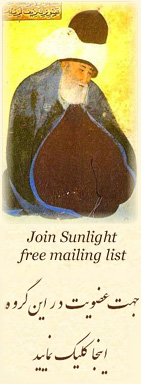Here, Sunlight offers three presentations of the verses from
the Mathnawi, Book V, lines 2020-2043, first in a poetic version
from Coleman Barks, and then in literal translations from William
Chittick and Reynold Nicholson:
^ ^ ^ ^ ^ ^
The Sunrise Ruby
In the early morning hour,
just before dawn, lover and beloved wake
and take a drink of water.
She ask, "Do you love me or yourself more?
Really, tell the absolute truth."
He says, "There's nothing left of me.
I'm like a ruby held up to the sunrise.
Is it still a stone, or a world
made of redness? It has no resistance
to sunlight."
This is how Hallaj said, I am God,
and told the truth!
The ruby and the sunrise are one.
Be courageous and discipline yourself.
Completely become hearing and ear,
and wear this sun-ruby as an earring.
Work. Keep digging your well.
Don't think about getting off from work.
Water is there somewhere.
Submit to a daily practice.
Your loyalty to that
is a ring on the door.
Keep knocking, and the joy inside
will eventually open a window
and look out to see who's there.
-- Version by Coleman Barks
"The Essential Rumi"
Castle Books, 1997
^^^^^^^^^^^^^^^^^^^^^^^^^^^^^^^^^^^^^^^^^^^^^^^^^^
One morning a beloved said to her lover to test him,
"Oh so-and-so,
I wonder, do you love me more, or yourself?
Tell the truth, oh man of sorrows!"
He replied, "I have been so annihilated within
thee that I am full of thee from head to foot.
Nothing is left of my own existence but the
name. In my existence, oh sweet one, there is naught
but thee.
I have been annihilated like vinegar in an ocean
of honey."
In the same way, a stone transformed into a
flawless ruby has become full of the attributes of the
sun.
The description of that stone does not remain
within it – full of the sun's description, front and back.
Should it love itself, then that will be love for
the sun, oh youth!
Should it love the sun to the bottom of its soul,
without doubt it will be in love with itself.
-- Translation by William C. Chittick
"The Sufi Path of Love- The Spiritual Teachings of Rumi"
State University of New York Press, Albany, 1983
^^^^^^^^^^^^^^^^^^^^^^^^^^^^^^^^^^^^^^^^^^^^^^^^^^
At the hour of the morning-drink a beloved said to her lover
by way of trial, "O such-and-such son of such-and-such,
I wonder, do you love me or yourself more? Tell the truth,
O man of sorrows."
He replied, "I have become so naughted in thee that I am
full of thee from head to foot.
Of my existence there is nothing (left) in me but the name:
in my being there is naught but thee, O thou whose wishes are
gratified.
By that means I have become thus naughted, like vinegar, in
thee (who are) an ocean of honey."
As the stone that is entirely turned into pure ruby: it is filled
with the qualities of the sun.
That stony nature does not remain in it: back and front, it is
filled with sunniness.
Afterwards, if it love itself, that (self-love) is love of the sun,
O youth;
And if it love the sun with (all) its soul, `tis undoubtedly love
of itself.
Whether the pure ruby loves itself or whether it loves the sun,
There is really no difference in these two loves: both sides
(aspects) are naught but the radiance of the sunrise.
Until it (the stone) has become a ruby, it is an enemy to itself,
because it is not a single "I": two "I's" are there;
For the stone is dark and blind to the day (-light): the dark is
essentially opposed to light.
(If) it love itself, it is an infidel, because it offers intense
resistance to the supreme Sun.
Therefore `tis not fitting that the stone should say "I," (for)
it is wholly darkness and in (the state of) death.
A Pharaoh said, "I am God" and was laid low; a Mansur
(Hallaj) said, "I am God" and was saved.
The former "I" is followed by God's curse and the latter
"I" by God's mercy, O loving man;
For that one (Pharaoh) was a black stone, this one (Hallaj) a
cornelian; that one was an enemy to the Light, and this one
passionately enamoured (of it).
This "I," O presumptuous meddler, was "He" (God) in the inmost
consciousness, through oneness with the Light, not
through (belief in) the doctrine of incarnation.
Strive that thy stony nature may be diminished, so that thy
stone may become resplendent with the qualities of the ruby.
Show fortitude in (enduring) self-mortification and affliction;
continually behold everlasting life in dying to self.
(Then) thy stoniness will become less at every moment, the
nature of the ruby will be strengthened in thee.
The qualities of (self-) existence will depart from thy body,
the qualities of intoxication (ecstasy) will increase in thy head
(thy spiritual centre).
Become entirely hearing, like an ear, in order that thou mayst
gain an ear-ring of ruby.*
-- Translation by Reynold A. Nicholson
"The Mathnawi of Jalalu'ddin Rumi"
Published and Distributed by
The Trustees of The "E.J.W. Gibb Memorial
* Literally, "an ear-ring (consisting) of a ruby ring."
The media:
http://tinyurl.com/vehxa

"There is really no difference in these two loves"

















